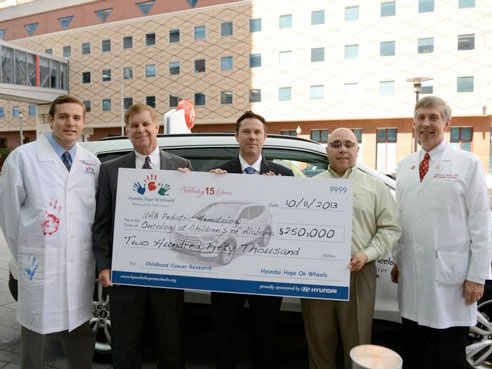 The Division of Pediatric Hematology-Oncology at Children’s of Alabama has been awarded a $250,000 Hyundai Hope on Wheels grant to support the research of Assistant Professor Gregory Friedman, M.D. The grant, which was awarded last week at a special Hope on Wheels Handprint Ceremony, will focus on developing novel, targeted, less toxic therapies for children with brain cancer.
The Division of Pediatric Hematology-Oncology at Children’s of Alabama has been awarded a $250,000 Hyundai Hope on Wheels grant to support the research of Assistant Professor Gregory Friedman, M.D. The grant, which was awarded last week at a special Hope on Wheels Handprint Ceremony, will focus on developing novel, targeted, less toxic therapies for children with brain cancer.
Brain tumors are the most common solid tumor and a leading cause of cancer-related death in children, affecting nearly 1,500 to 2,000 children in the United States every year. Current therapies, including surgery, chemotherapy and radiation, are very detrimental to the developing brain, and simply augmenting the dose of these therapies will likely increase toxicity without significantly improving survival. Therefore, innovative, targeted treatment strategies are desperately needed to improve outcomes and decrease toxicity to the developing brain for children with malignant brain tumors.
Friedman’s research focuses on using viruses that have been genetically engineered to be safe for normal cells but are deadly to cancer cells.
“Not only do these viruses kill cancer cells directly, but they can harness the patient’s own immune system to attack the cancer as well, providing a one-two punch to the cancer cells,” he said.
Friedman, an associate scientist in the neuro-oncology program at the UAB Comprehensive Cancer Center, believes this more directed approach will lead to fewer side effects and higher cure rates.
“We hope the research made possible through this Hyundai Hope Grant will enable us to translate these virus therapies from the lab to the clinics to benefit children with difficult-to-treat tumors,” he said. “Additionally, this grant enables us to examine ways in which cancer cells resist being killed by the virus, so we can predict which patients will respond best and newer viruses which circumvent those resistance mechanisms can be designed.”
Hyundai Hope on Wheels is a united effort of Hyundai Motor America and its more than 800 dealers to raise awareness about childhood cancer and celebrate the lives of children battling the disease. The group funds primarily nonprofit children’s hospitals across the United States for pediatric cancer research and strives to build public awareness about the importance of this cause.